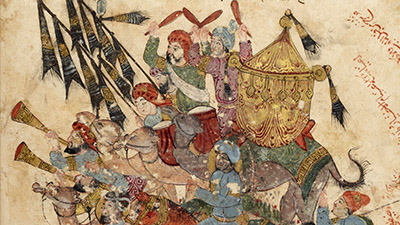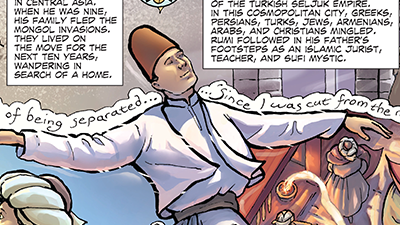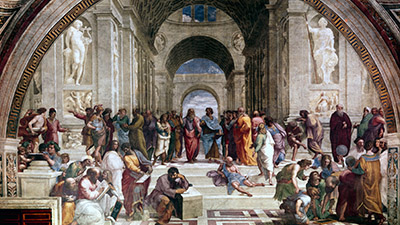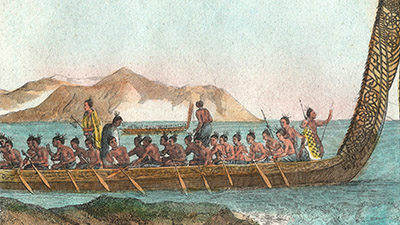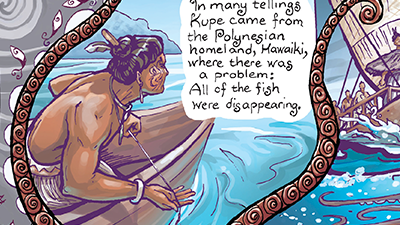Cultural Exchange in Afro-Eurasia
Teacher Resources
Driving Question: How did trade connections change cultures in Afro-Eurasia?
Networks of exchange across Afro-Eurasia moved science, technology, and culture to new places. Religions spread, as did advancements in fields such as astronomy, medicine, and mathematics. The circulation of all these innovations contributed to the development of a global body of knowledge.
Learning Objectives:
- Learn about how trade produced technological and scientific innovations.
- Assess the religious conflicts and transformations that took place in this period.
- Develop the historical thinking skill of causation and evaluate the impacts of long-distance trade on the European Renaissance.
Vocab Terms:
- caravel
- enslave
- finance
- innovation
- missionary
- Renaissance
- syncretism
Opener: Cultural Exchange in Afro-Eurasia
To teach this lesson step, refer to page 2 of the Lesson 6.4 Teaching Guide.
Need a reminder of why we do openers and closers in OER Project lessons? Look no further than this guide.
Reflect on what you’ve learned about the causes and consequences of increased connectivity in this period.
Cultural Shifts
To teach this lesson step, refer to page 3 of the Lesson 6.4 Teaching Guide.
Take a look at the Community thread Adapting the Traveler’s Postcard to see how other OER Project teachers have used this activity.
Graphic biographies are an exciting feature of OER Project courses, learn more about them in the OER Project Graphic Biographies Guide.
Trade, war, and pilgrimages often lead to cultural exchange, and societies are forever changed as a result. Find out how with this article, graphic biography, and activity.
-
Guiding Questions
-
Before you read
Preview the questions below, and then skim the article. Be sure to look at the section headings and any images.
While you read
Look for answers to these questions:
- What two main regions/cultures of Afro-Eurasia made the most remarkable contributions to technology in other regions?
- What were some of the major technological contributions made by China and the Islamic world in this period (1200 to 1450)?
- What different religious traditions came together in Southeast Asia in this period?
- What shape did Islam take in many of its movements and adaptations around the region?
After you read
Respond to this question: Why do you think people were willing or even enthusiastic to adopt ideas from other places?
-
Guiding Questions
-
Before you read
Preview the questions below, and then skim the comic, paying attention to things like prominent colors, shapes, and types of text and fonts. How do you know where to start and in which direction to read? What’s in the gutters (the space between panels)? Who or what is the focus of the comic?
While you read
- Where did Rumi live as a young man, and what was his home city like?
- How did meeting Shams Al-Dīn transform Rumi?
- What did Rumi teach and write about?
- What is the meaning of Rumi’s poem about a reed, shown around his body in the biography?
- How does the artist’s design reflect the theme of crossing or transcending borders?
After you read
Respond to this question: How does this graphic biography of Rumi support, extend, or challenge what you have learned about cultural exchange during this period?
Renaissance Narratives
To teach this lesson step, refer to page 5 of the Lesson 6.4 Teaching Guide.
Interested in Challenging Traditional Views of the Renaissance? Check out this conversation.
In fourteenth-century Italy, a cultural movement of artists and scholars launched the European Renaissance. Use this article and activity to explore how this movement reshaped European culture and science.
-
Guiding Questions
-
Before you read
Preview the questions below, and then skim the article. Be sure to look at the section headings and any images.
While you read
Look for answers to these questions:
- What was the Renaissance?
- What did Renaissance thinkers and artists in Italy believe they were doing?
- How did different types of people experience the Renaissance?
- How did trade help start the Renaissance?
- What does the painting The King’s Fountain suggest about life in Renaissance Europe?
After you read
Respond to this question: How would you describe the Renaissance to somebody who knew nothing about it?
Changing Beliefs
To teach this lesson step, refer to page 6 of the Lesson 6.4 Teaching Guide.
Looking to differentiate, modify or adapt this activity? Check out our Differentiation Guide.
The work of one person can change everything. This was the case when a local monk fighting corruption in the Catholic Church set in motion a religious conflict that continues to influence our world today.
-
Guiding Questions
-
Before you watch
Preview the questions below, and then review the transcript.
While you watch
Look for answers to these questions:
- What sixteenth-century practices of the Catholic Church and its pope led people to accuse the church of corruption?
- What criticisms of the Catholic Church did Martin Luther make in his Ninety-five Theses?
- Why was Protestantism appealing to women and what contributions did some women make to the movement?
- How did the Reformation lead to the death of millions of people?
- Who were the Jesuits and why was this order created?
After you watch
Respond to this question: In what ways is the sixteenth-century Protestant Reformation still relevant today?
Key Ideas
Closer: Cultural Exchange in Afro-Eurasia
To teach this lesson step, refer to page 7 of the Lesson 6.4 Teaching Guide.
Closers are a great way to informally assess student understanding. Read more about that in the OER Project Assessment Guide.
You’re probably starting to see that there’s a positive and negative side to many historical events. Weigh the pros and cons of cross-cultural exchange and transformation.
Communities of Oceania
To teach this lesson step, refer to page 7 of the Lesson 6.4 Teaching Guide.
Imagine living among thousands of islands spread across vast expanses of ocean. The peoples of Oceania developed navigation technology that allowed them to stay connected to one another and maintain economic and cultural ties across thousands of miles of open ocean.
-
Guiding Questions
-
Before you read
Preview the questions below, and then skim the article. Be sure to look at the section headings and any images.
While you read
Look for answers to these questions:
- How do historians believe that humans ended up settling the islands of Oceania? What debate surrounds this question?
- What were the most important innovations that allowed migrations across Oceania?
- In general, how did communities in this region organize themselves?
- What were gender relations like in Oceania societies?
- What evidence is there to show that Oceania was not separated from the rest of the world?
After you read
Respond to this question: How does production and distribution in Oceania compare to what you’ve learned about in Afro-Eurasia?
-
Guiding Questions
-
Before you read
Preview the questions below, and then skim the comic, paying attention to things like prominent colors, shapes, and types of text and fonts. How do you know where to start and in which direction to read? What’s in the gutters (the space between panels)? Who or what is the focus of the comic?
While you read
- Who was Kupe?
- How is the story of Kupe normally told in Polynesian society? How have European historians tried to tell it?
- Why is this story important for the Māori people today?
- How did the artist use art and design to demonstrate the theme of connectedness?
After you read
Respond to this question: What does this graphic biography suggest about the different ways history is used?


